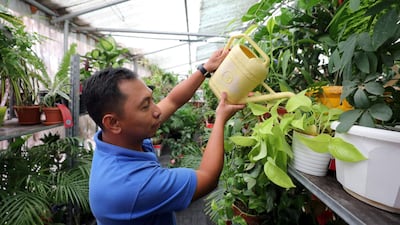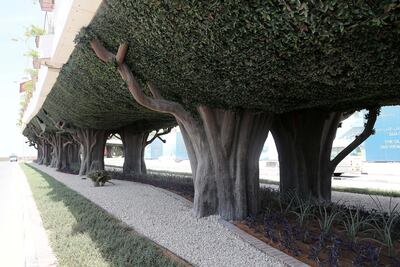Most people shriek at the idea of swapping out real plants for artificial alternatives. But a simple switch could significantly reduce water consumption in the UAE.
The global water crisis is no secret and natural resources are slowly depleting as demand increases. In the UAE, water usage is already unsustainable.
One of the biggest offenders when it comes to water use and waste is landscaping.
The average property owner over-saturates plants by 38 per cent, said Dubai Electricity and Water Authority (Dewa). And water used for gardening amounts to 50 per cent of the total consumption in the majority of homes in the UAE.
“It is not good to be disrespectful about the preciousness of resources,” said Ivano Ianelli, chief executive at Dubai Carbon.
“When gardening, you have to look at ways of reducing water consumption... research the amount of water required for each type of plant, don’t just go in blind because that’s when waste happens.”
The construction of desalination plants and a cloud-seeding strategy has helped the UAE address water challenges. However, challenges still remain.
The idea of using artificial plantation for small-scale city beautification projects could help curb the abuse of vital water resources, Ianelli said.
“Dubai Municipality uses recycled waste water to irrigate the green spaces around Dubai and it’s admirable.
“But in this climate, artificial plant alternatives could be a good option for some landscapes where the water resources needed to maintain real plants and trees would not warrant the investment.”
Take for instance the bridge on the Palm Jumeirah that was transformed into a lush green forest in 2017.
More than 10 artificial trees line the underpass of the monorail bridge, disguising the concrete pillars with a canopy of foliage.
An area like that would typically require “hundreds of litres of water a day” to keep the trees thriving, but this uses zero, all while maintaining the desired aesthetic.
“Because of the type of climate we live in, some plants will not absorb as much CO2 compared to the amount of water it consumes," he said.
“So it wouldn’t make sense to abuse the resources, hence artificial options could work.”
Avoiding plastic varieties and opting for those made from recycled material would be preferable.
However, it is about “striking the right balance” as plants and trees are “a vital part of the eco-system”.
Speaking to The National, Talib Julfar, head of the infrastructure services sector at Dubai Municipality, said the city's landscaping projects take into consideration both "beautification and the environment".
"We have a challenge in Dubai to reduce water consumption for plantation from 10-12 litres per square metre of grass to about six litres.
"We also have to keep an eye on maintenance costs, which is why we use some non-plant landscape elements such as gravel, stones and artificial turf."
About "90 per cent" of Dubai Municipality's landscaped areas use natural fauna and flora, but some projects, in Oud Metha Road and Zabeel intersection for instance, use artificial elements.
In the desert, water is perhaps our most valuable resource, so surfacing like artificial grass can be a viable solution to satisfy water savings and still function as intended.
"A turfed area uses about 12 litres of water per square metre in the summer and if there is no efficient irrigation system installed, this number can be much higher," a spokesman for the Sustainable City said.
“This means a modest sized lawn of 10 metres by 10 metres would use about 36,000 litres of water per month in the peak times of heat and irrigation.
“Just stop and imagine 36,000 litre bottles of water.”
However, he said there is an "intangible value" to something like real grass or plants.
Trees and plants play a major role in producing the oxygen we all breathe. They draw carbon dioxide back out of the atmosphere as they grow too, which helps to cool down the temperature of the earth.
"But with the goals of low maintenance and low to no water use, the small-scale use of eco-friendly artificial plants can help tackle the UAE’s high water consumption," he said.



